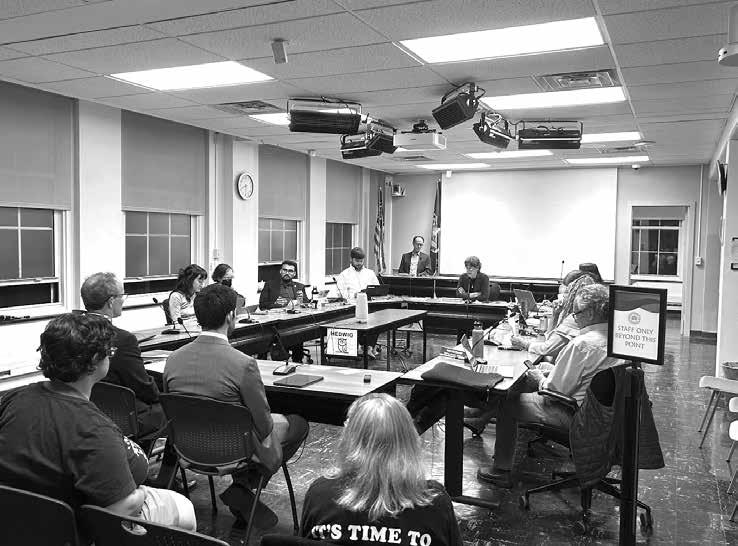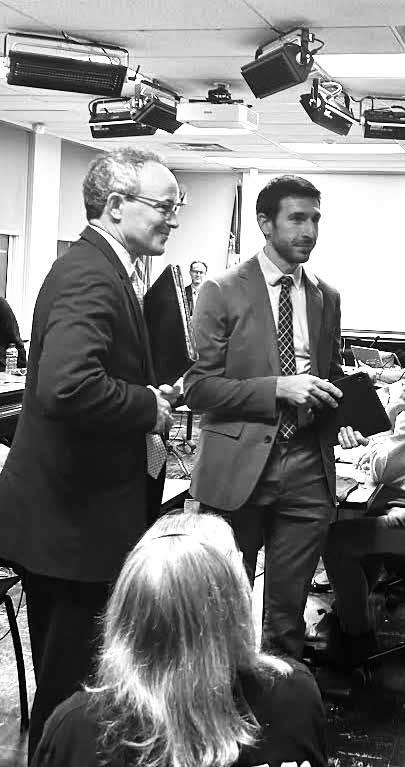PAGES
PAGES







PAGES
PAGES






 By Staff Report
By Staff Report
Tompkins County Whole Health (TCWH) is sharing with the community about an upcoming event, on behalf of theTompkins County Suicide Prevention Coalition (TCSPC). The event, “How Healthcare Helps Prevent Suicides,” will be a community town hall to discuss local efforts to implement the “Zero Suicide” model for improving healthcare support for at-risk individuals.
The town hall will take place at the Greater Ithaca Activities Center (GIAC) at 301 W. Court Street (Ithaca) on Thursday, September 28th from 5:30 p.m. – 7:30 p.m.. The town hall will feature panel discussions about why suicide is a public health challenge and how the “Zero Suicide” model is used by healthcare systems to prevent suicide deaths. This event is free to attend and is open to the public.
TCWH Commissioner Frank Kruppa will kick off the town hall with opening remarks. Organizations serving as presenters and panelists include: TCWH’s Mental Health Services; Cayuga Health System; Cayuga Medical Associates; Guthrie Medical Group, Cortland; Cornell University; Ithaca City School District; Alcohol and Drug Council; U.S. Department of Veterans Affairs; Suicide Prevention & Crisis Service (988 Call Center); Cayuga Addiction Recovery Services; Smile Through the Storms; and The Sophie Fund.
In addition, coalition work groups will give brief presentations on their work to improve suicide data collection and analy-
sis, prevent suicides among young people, and reduce access to lethal means within at-risk populations.
Several local mental health agencies and organizations will be present to provide information and answer questions. Participating programs will include: Tompkins County Whole Health; Tompkins County Office of Veterans Services; U.S. Department of Veterans Affairs; Mental Health Association in Tompkins County; Suicide Prevention & Crisis Service (988 Call Center); American Foundation for Suicide Prevention Greater Central New York; and the National Alliance on Mental Illness Finger Lakes.
“We recognize the critical role of healthcare in preventing suicide deaths,” said Zoe Lincoln, TCWH’s Planner and Coordinator of the Tompkins County Zero Suicide Steering Committee, a collaborative group of local healthcare leaders. “The Town Hall highlights county-wide dedication to saving lives through evidencebased best practices, via the Zero Suicide Model. Together, we strive to elevate the standard of care and support for our community members in need.”
“Zero Suicide” is an emerging suicide prevention model designed to save lives by closing gaps in suicide care in healthcare as well as behavioral health settings. The model calls for systematic use of screening for self-harm, safety planning for patients deemed at risk, referrals to appropriate levels of further care, safe transitions of care between providers, and evidence-based treatment for suicidality, among other tools.
The 2023 International Fly Fishing Film Festival is coming to Ithaca on Sept. 28 featuring 10 short and feature-length films.
The screening, at the Hopshire Farm and Brewery, 1771 Dryden Rd., Freeville, will showcase fly fishing films from all corners of the globe. The films begin at 7 with the theater doors opening at 5:30 p.m.
The event is hosted by the conservation organization Leon Chandler Chapter of Trout Unlimited. General admission to the event is $15. Youth 12 and under are free. Raffle tickets are $10 or three for $25. General admission plus three raffle tickets are $35. General
Implementation of “Zero Suicide” across local healthcare is one of the objectives listed in the Coalition’s 2022-2025 Strategic Plan. In 2022, leaders from community and campus healthcare providers formed the Tompkins County Zero Suicide Steering Committee to lead and coordinate efforts.
The Tompkins County Suicide Prevention Coalition was formed in 2017 and is comprised of health agencies, community organizations, and individual members who share a determination to prevent suicide deaths in the community.
“We are excited to present this Town Hall with a focus on Zero Suicide,” said Sally Manning, Racker Program Director and convenor of the Coalition. “We recognize suicide as a serious public health concern. The Coalition has a vision for our community where no lives are lost to suicide. This is a chance to learn more about suicide prevention and what we can all do to help those who may be struggling.”
Continued on Page 7
ON
Paleontological Research Institute & Museum of the Earth Celebrate Colossal Anniversary.
Visit
M att D ougherty , M anaging E ditor , x 1217
E ditor @ i thaca t im E s com
C hris i bert C al E ndar E ditor , a rts @ i thaca t im E s com
a n D rew s ullivan , S port S E ditor , x 1227 s ports @ flcn org
M att D ougherty , n E w S r E port E r , x 1225 r E port E r @ i thaca t im E s com
M i C helle l a M orte , p hotograph E r s teve l awren C e , S port S C olu M ni S t s t E v E s ports d ud E @ gmail com
l u C y a llen , F ront d ES k F ront @ tha C a t MES C o M
J i M b ilinski , p ubli S h E r , x 1210 jbilinski @ i thaca t im E s com
l arry h o C hberger , a SS o C iat E p ubli S h E r , x 1214 larry @ i thaca t im E s com
F r EE lan CE r S : Barbara Adams, Stephen Burke, G. M Burns, Alyssa Denger, Jane Dieckmann, Charley Githler, Ross Haarstad, Steve Lawrence, Marjorie Olds, Henry Stark, Bryan VanCampen, and Arthur Whitman
THE ENTIRE CONTENTS OF THE ITHACA TIMES ARE COPYRIGHT © 2023, BY NEWSKI INC.
admission plus a one year subscription to Fly Fusion Magazine is $40. All proceeds from this event are used to fund LCTU's Trout in the Classroom program and to send local youth to the New York DEC summer camp.
For information about this screening, contact the host at donaust@gmail.com.
Event attendees can win fly fishing-related prizes and awards from Film Festival sponsors. One person will be selected winner of the 2023 Grand Prize valued at thousands of dollars of merchandise. For information about the film festival, contact info@flyfilmfest.com.
All rights reserved. Events are listed free of charge in TimesTable. All copy must be received by Friday at noon. The Ithaca Times is available free of charge from various locations around Ithaca. Additional copies may be purchased from the Ithaca Times offices for $1. SUBSCRIPTIONS: $89 one year. Include check or money order and mail to the Ithaca Times, PO Box 27, Ithaca, NY 14851. ADVERTISING: Deadlines are Monday 5 p.m. for display, Tuesday at noon for classified. Advertisers should check their ad on publication. The Ithaca Times will not be liable for failure to publish an ad, for typographical error, or errors in publication except to the extent of the cost of the space in which the actual error appeared in the first insertion. The publisher reserves the right to refuse advertising for any reason and to alter advertising copy or graphics deemed unacceptable for publication.
The Ithaca Times is published weekly Wednesday mornings. Offices are located at 109 N. Cayuga Street, Ithaca, NY 14850 607-277-7000, FAX 607277-1012, MAILING ADDRESS is PO Box 27, Ithaca, NY 14851. The Ithaca Times was preceded by the Ithaca New Times (1972–1978) and The Good Times Gazette (1973–1978), combined in 1978. FoundEr good t MES gazEttE: toM newton
 By Matt Dougherty
By Matt Dougherty
The City of Ithaca will be working towards dissolving its Board of Public (BPW) works sometime in 2024 as the advisory board has not met since 2020, and many of its responsibilities have been taken over by city staff and the Common Council.
The BPW is supposed to consist of six city residents appointed by the Mayor to oversee the Department of Public Works (DPW) and educate the public and Common Council about DPW operations. Since assuming office it’s unclear why Mayor Laura Lewis has not appointed anyone to the board.
The Mayor’s Chief of Staff, Deb Molenhoff, has said that bypassing the BPW and bringing items to Council directly has been “more timely and efficient,” and that “DPW operations have been more streamlined without the BPW.”
However, First Ward Alderperson Cynthia Brock has said that the community has been “at a considerable disadvantage” over the last three years because advisory boards and commissions like the BPW have not met. Regarding comments about operations becoming more efficient without the BPW, Brock said, “It is efficient when the Council just becomes a rubber stamp and nobody’s really paying attention.”
In response to Brock's comments in a recent Ithaca Times article about the current state of the BPW and its impact on city government, Superintendent of Public Works Michael Thorne said, “Infrastructure in Ithaca, in New York State, and all across the country have been underfunded and deteriorating for decades. Labor shortages and supply-chain issues from the pandemic hit every industry around the world and exacerbated these problems. Public Works departments throughout the country have been struggling with this reality.”
Thorne continued saying, “[Brock’s] statement implies that the Department of Public Works (DPW) has somehow failed the City due to lack of direction from the BPW, a citizen board which is unique to Ithaca that other municipalities don’t have, without recognizing the multiple complicated factors that have contributed to infrastructure problems across the nation.”
According to Thorne, Brock’s comments didn’t “acknowledge the extensive expertise held by DPW employees, as though staff are incapable of prioritizing work and managing difficult situations without this citizen board. He added, “Her statement is both misleading to the public and insulting to DPW staff.”
Brock served on the Board of Public Works from 2009-2011 and told the Ithaca Times that during her time on the BPW, she “saw the power of this board to educate and engage both citizens and Common Council as well as provide direct oversight of the DPW.”




In response to Thorne’s comments, Brock told the Ithaca Times, “The public wants our advisory boards and commissions reinstated. As do I.” She added, “Our DPW staff are exemplary; they work hard, and they have a big job. We need the Mayor to bring back the BPW to actively support our departments: this will make for better roads, services, and better City employee satisfaction.”

Brock said that the BPW was “utilized to great effect because it allowed different departments to highlight their needs to the public and educate Council when the department needs more funding, resources or assistance.”
Brock said that regular meetings of the BPW ended with the pandemic shutdown. She continued saying, “the important work of meeting with DPW department heads, advocating for approved hiring, working in-depth on services and land resources, reviewing budgets and expenditures, and focusing on large-scale projects over time ceased.”
According to Brock, “during the last three years without the DPW, there has been very little talk about infrastructure at all on the Council.” She added, “that lack of educational opportunity, has a negative effect, especially when it comes around to budget time.”
Brock said the 2020 City budget included a new seven-person crew in Streets and Facilities to focus on road reconstruction and infrastructure, but the crew was never hired due to complications caused by COVID-19. Brock says that if the BPW was active, it would have “advocated directly to the Common Council to push for these positions to be filled when the City received recovery funding.”
When asked about what happened to the money that was allocated towards hiring the crew Brock said, “That is a question that I think the BPW would have had the bandwidth [to ask] because it is their charge.”

She continued saying, “it is mandated in the City Charter that the BPW shall take charge of and oversee the Department of Public Works.”
Brock added that when she asked the same question to city staff and the Mayor during the budget process, “They had no response.”
“[Brock’s] statement implies that the Department of Public Works (DPW) has somehow failed the City due to lack of direction from the BPW.”
— Mike Thorne
“During the last three years without the DPW, there has been very little talk about infrastructure at all on the Council.”
— Cynthia Brock
After years of quietly sabotaging the Board of Public Works (BPW), the City of Ithaca is formally considering the dissolution of the Board. The quiet sabotage took the form of neglecting to fill positions, which resulted in the lack of quorums; bringing fewer agenda items to the table for the Board’s consideration; and cancellation of meetings resulting from the small number of agenda items put forth. Dedicated BPW members, ready to prepare for and attend meetings, were routinely disappointed by frequent cancellations. What was once a lively, flourishing democratic forum in the City of Ithaca languished and slowly became an atrophied limb.
So, what is the Board of Public Works, and why does it matter? As a voluntary citizen member of the Board from 2010-2020, I would like to address these questions.
The City Charter, passed in 1908, mandates the BPW to take charge of the Department of Public Works, and advise elected officials in matters concerning streets and facilities, including water and sewer, streets, sidewalks, city parks, city buildings, city parking, and trash removal. The purpose of a citizen board is to provide a non-politcal, non-partisan
balance to the power of elected and salaried officials, and to provide a transparent, public forum for citizens to express their concerns.
During the years when I was on the BPW, we worked on important issues like the re-configuration of the “Octopus” (the convergence of routes 89, 79 and 96 at the inlet), but we also dealt with many “small town” mundane issues like snow removal and water bill disputes. Notably, BPW is the last step to address grievances, before litigation. In other words, ordinary Ithacans with a grievance (like a sidewalk in disrepair), after exhausting bureaucratic avenues, can come before the Board to ask assistance in addressing their grievances. BPW always listened carefully. Then we did our research and either denied the request or worked with the city to address the issue.
Recently, Deb Mollenhoff , Chief of Staff for the City Government, is quoted in the Ithaca Times as saying that “nearly all items that would have been brought to BPW were handled in a more timely and efficient manner by staff coordination and approvals or bringing those items that required approval to Council
The Friends of Newman Golf Course would like to express their support of having an active Board of Public Works.
As a designated City of Ithaca park, the Newman Municipal Golf Course is managed by the Department of Public Works. Before the Board of Public Works suspended meetings in 2020, the Board was
the direct liaison between the Golf Course and Common Council. The Board would annually discuss and recommend rates for memberships and play, as well as discuss maintenance issues needed to keep the Course in the pristine condition that it is. Board members were familiar with all the benefits the Newman parklands provided for the community. These include an affordable golf experience for all ages, bird and nature watching as well as crosscountry skiing in the off-season.
directly.” She further goes on to say that “BPW approval would have been a redundant step.’’
Our Advisory Commissions and BPW are designed in the Charter to promote public engagement, going deep into issues in a way that Council cannot. The BPW has the additional power and jurisdiction to make DPW decisions and thus avoiding the need to go to Council. This in fact improves the efficiency of government and reduces the burden on Council agendas. Without the BPW Ithaca becomes a less democratic city government.
When issues are important and widereaching, BPW meetings are well-attended by the public. For example, during the “Occupy the Park” movement in 2011, people were lined up in the hall, down the stairs and out the door, spilling onto the sidewalk. Why? Because BPW was a transparent, public forum that interfaced with elected officials and bureaucracy. BPW was a support to the Common Council because it could listen and respond to the public.
When a developer wants to proceed in a way that impacts on the surrounding neighbors, people can come to BPW, which will research the issue and advise Council. For example, when the City Center Building on State and Aurora Streets was proposed, the plans did not allow for sufficient pedestrian space. Neighboring
State Senator Lea Webb is hosting a Community Health Resource Fair from 5:30 p.m. to 7:30 p.m. on September 27 at the Greater Ithaca Activities Center (GIAC). Fee COVID-19 tests and masks will be available at the event, as well as Narcan training and distribution.
A 21-year long MOU with Cornell.
The Community Justice Center (CJC), a collaborative between the City of Ithaca and Tompkins County to implement joint Reimagining Public Safety plans, is announcing the opening of two “Community Resource Hubs” in Enfield and Groton. The hubs provide residents with access to information and the internet, online forms for services and benefits, transportation and housing resources, and the ability to take health or other appointments online or over the phone. The hubs will be staffed during the 2023 pilot period by the Community Justice Center. The hubs are free for anyone in the community to access.
Seen
Cornell Big Red Football beat Yale by a margin of 23-21 on September 23 at the Yale Bowl. The win marked Cornell's first 2-0 start in program history with both wins coming on the road.
IF YOU CARE TO RESPOND to something in this column, or suggest your own praise or blame, write news@ithacatimes. com, with a subject head “U&D.”




As of the 2020 cessation of the Board meetings, a major development project, City Harbor, has been approved. The project has taken land from Newman’s historic parkland for parking and traffic flow without offering an equitable replacement. We believe if the Board of Public Works had been active, it would have delved deeper into the issue and developed solutions for the Common Council to consider. We believe the Board’s appointed volunteers reduce the time and energy needed to assign paid Department of Public Works employees to perform tasks similar to the above example.
We ask that the City and the community consider the benefits the Board of Public Works has provided to many individuals and groups that utilize Newman Golf Course and all other public parklands in the City.

What are you looking forward to as the fall approaches?
64.7% Leaves changing colors.
32.4% Apple cider donuts.
2.9% Pumpkin spice everything.
N ext W eek ’s Q uestio N : Do you think the City should get rid of the Board of Public Works?
“Without the BPW Ithaca becomes a less democratic city government.”
— Former BPW Member, David Warden
Ithaca just can’t let go of that myth of it being that poor little financially beleaguered town impoverished by that greedy Ivy League institution on East Hill. It has even codified its mythical plight in its 2015 Plan Ithaca comprehensive plan: “A severely limited tax base adds to the affordability concerns faced by many city residents. Nearly 40 percent of the land area within the city is tax-exempt, comprising nearly 60 percent of the total assessed value of properties in the city. The remaining property owners must carry the tax burden for the entire city, resulting in higher taxes for both residents and businesses” (Plan Ithaca, pg. 57).
Around 40% of the land area in Ithaca is indeed tax-exempt, with the largest holder of tax-exempt property being the City Ithaca, which owns about 20% of itself. It’s primarily in the form a park system that is second to none in Upstate NY, where many fiscally strapped cities have surrendered their park systems to counties.
Cornell’s $2.7 billion in tax-exempt property is a hefty chunk, but it doesn't take very many $150 to $200 million spe-
cialize research facilities, and a half-billion or so spent on new dormitories over the past 2 decades, to reach $2.7 billion in assessed valuation.
Ithaca NY, a city of some 31,000, sits on $2 billion-plus of taxable property, a tax base few cities its size in the US can boast of. Of Upstate NY cities with populations of between 10,000 and 40,000, Ithaca has the 2nd largest taxable property base in the region, 2nd only to Saratoga Springs. In per-capita terms, Ithaca at just under $65,590 per resident in taxable property value, lags behind only Canandaigua ($69,850) and Saratoga Springs ($106,240). Even Corning ($55,160), home to Fortune 500 Corning Inc., can’t match Ithaca’s tax base.
Especially compared to regional peers Geneva, Elmira, Binghamton, and Cortland, Ithaca is flush with taxable property, having a per-capita taxable property base that ranges between 1.8 times and 2.6 times the tax bases of these cities. Our "onerous" city tax burden is 52% what Binghamton residents pay, and 75% what Geneva residents pay. Only Auburn has
Continued on Page 15
 By Barbara Regenspan
Dear Gary Stewart, (Cornell’s Vice President for Community Relations):
By Barbara Regenspan
Dear Gary Stewart, (Cornell’s Vice President for Community Relations):
I wanted to thank you for the enjoyable first part of the conversation we had yesterday when I was able to learn about your truly fascinating and adventurous life experiences, and to share my own love of teaching and life here more generally.
I followed up by participating in the rousing Common Council meeting last evening, which renewed my appreciation for the invigorating dynamics of attachment to a well-articulated cause at age 71, in retirement from a full-time and very gratifying career in higher education.
When you and I spoke yesterday on the phone I, early on, had the realization that the adventurous and humanely-focused life experience you described tends to engender the values on the side of the demands we are making for a fair MOU with Cornell. So I was taken aback when you countered the compelling data in former city attorney Charles Guttman's calculations (that I referred to when we got down to brass tacks) with “I can see that Cornell needs to get better at telling its story.”
Cornell’s current contributions to the community that I assume you refer to as “its story” are already appreciated. But they have nothing to do with Cornell's obligation to help maintain the human and material infrastructure of the city (and county) the University’s very presence puts under great strain.
Here I am referring to our prohibitive rents and property taxes, the reality that the very workers who build, re: Cornell's continual expansion, cannot afford to live here or pay for childcare, the dangerous deterioration of the city/county’s water and sewage systems, the underfunding of our mental health services, the lack of a living wage for our daycare workers, the inability to pay competitive salaries to city managers... This summer I even experienced the now-classic story of a visiting Cornell parent cursing in the street around the corner from our downtown home over the damage their car incurred by driving into one of our pervasive potholes!
I am only now learning—fully internalizing for the first time I am embarrassed to admit—that what Cornell owes Ithaca is a reflection of Cornell’s apparent willingness to allow the city’s material and human infrastructure to deteriorate over years. This was the subject of Monday's demonstration and many of the comments last evening.
I admit that that focus disturbed me on Monday because I wanted to hear an emphasis on how our job as a coalition is to help Cornell preserve its integrity and excellent reputation as an institution of higher education. I personally enjoyed the academic freedom, rich library and writing department resources, and Center for Teaching Innovation supports to deliver a well-orchestrated course that affected the reading and writing ability, as well as historical consciousness of my students in obvious positive ways. The wonderful experience was repeated four times when I taught “Challenges of Modernity: How We Got Here” as ENGL 1131 during summer session 2019 thru 2022. But it is primarily the corporate side of Cornell’s behavior that greater community sees, not its academic side.
Further, I believe that Cornell’s administration that this current iteration of the city's struggle to wake up Cornell's administration to its responsibility for Ithaca's well-being is not like the struggles under previous city administrations. This time, the city's viability is far more fragile. This time, especially after Cornell's unwillingness to protect any but its own during COVID, there is far more anger towards the institution, shared by far more people in the community of all social classes, many of whom are facing varying degrees of exacerbated financial hardship. This time there is a broad and growing coalition urging our leaders to act. This time Cornell has a recently elevated reputation (via a higher ranking in U.S. News and World Report) to protect that puts it in direct competition and positioned for comparison with the behavior of Harvard, Yale, and Princeton with regard to their newest MOU's of some integrity. This last factor is probably the most significant in that Cornell is more vulnerable to nationallevel shaming, which may be the best tactic available to those of us determined to achieve a fair MOU.
Related to this last point, the threat made by Cornell’'s administration to withhold all payment in 2024 if the city refuses to accept Cornell’s insulting MOU offer has opened the institution to a credible-to-all charge of immoral dealing
In the regional running community, Ian Golden's name has come up in just about every capacity for the past 28 years. The Pennsylvania native showed up at Ithaca College as a freshman runner in 1995 (inducted into the Ithaca College Athletic Hall of Fame in 2019), he founded the Finger Lakes Running Company in 2006, and he has been involved in hundreds of races, as a runner, an organizer, a sponsor and many other roles. After serving as an assistant track and cross country coach at his alma mater for the past two years, Ian learned about an opening at Ithaca High school, and applying made sense on a few levels.
“I am the boys' coach,” Ian told me, “but I am also working with (head coach) Leeann Young to help develop Tsadia Bercuvitz.” Asked to elaborate, Golden said, “Tsadia is a 9th-grader, she ran varsity as an 8th-grader, and she is a phenomenal talent.” He added, “She might be one of the best Ithaca High has ever seen, and she's one of the better runners in the country.”
Given Ian has also worked extensively in the world of ultramarathoning, and is thus very well-versed in the importance of taking care of one's body, I asked him if he brought a different approach to coaching high school athletes. He said, “One
continued from page 3
September is National Suicide Prevention Month.
Suicide continues to be the second leading cause of death among Americans aged 10-34. According to the Coalition, Tompkins County has averaged 12 suicide deaths per year from 2016 to 2021. Another 1,600 parents, children, siblings, friends, and spouses may have been negatively impacted annually by psychological, spiritual, and/or financial loss resulting from the suicide deaths, the Coalition says.
The Coalition’s strategic plan states: “We believe that the persistent rise in the U.S. suicide rate over the past two decades demands a public health response from communities across the nation.”
objective is managing volume, and trying to assure these athletes have 20 years ahead of them as runners. There are some programs that have been very dominant, and have developed some elite runners, but their running careers do not have longevity. They are cooked.” He added, “As an assistant at Ithaca College, I was not the one writing the workouts, but now I am doing so, and I try to think about writing workouts that don't burn them out.”
Coach Golden went on to say, “Some college runners had their best times in 10th grade,” and he explained that for a variety of reasons, those runners did not get faster. In Golden's words, Everyone develops differently. I want to try to thread that needle, and understand how each athlete develops.”

Ian is also cognizant of the demands these young athletes are facing. He said, “A high bar has been set for these kids here at Ithaca High. Many of them are taking advanced level courses, they put in a lot of study hours – they have a lot on their plates.” That said, the first-year coach truly values the character he sees. “We have some great leadership,” Ian offered. “Our captains are Crosby Woods and Andrew Putnam, and I am impressed to see our athletes thanking the bus driver, making sure the bus is clean when we get off, they have a lot of character as a team.”
continued from page 5
businesses came to BTW to protest the incursions. The BPW listened, researched and advised the City, resulting in a better project.
Times change. Technology has transformed how we conduct government. The pandemic upended business as usual. Certainly, by allowing the Board of Public Works to languish these past few years, the City has demonstrated that it can get along without it.
But what is lost? Transparency, citizen involvement and a non-politcal, nonpartisan, accessible public forum.

That’s why we need a Board of Public Works.
Golden makes no secret of the fact that past of the reason he was drawn to apply for the job is the fact that two of his daughters are in the program ((Maren is a ninth-grade varsity runner and Nora, a seventh-grader, runs Modified). He said, “I'm excited for the opportunity to see my own girls develop.”
Ian plans to be around for a while, and he is excited to see the team chemistry come together. “Both (boys' and girls') will likely see their peak in a year, maybe two, and I hope to be here several years,” he stated. “I am really enjoying this. They're a great crew. I am very proud of them.”
Congratulations to the Cornell football team on their huge win in New Haven on
Saturday. Yale is the defending Ivy League champion, they planned to lay a thumping on the visiting Big Red, but Cornell fought back from a 14-0 deficit and won it 23-21 on a dramatic, walk-off field goal from Jackson Kennedy as the clock hit double zeros. The victory put the Big Red at 2-0 for the first time since 2016, and Cornell will host Colgate this Saturday at 2 pm at Schoellkopf Field for Homecoming.
The Ithaca City Common Council voted to approve a pilot policy to manage homeless encampments on city property and delay a final vote to authorize a new 21-year memorandum of understanding (MOU) with Cornell University during a special meeting on September 20.
Mayor Laura Lewis has said that a final vote on the new MOU will take place at another special meeting of the Common Council scheduled for October 11. “This will allow a window of opportunity for continued public input and for Common Council members to communicate with constituents and amongst one another,” Lewis said.
The meeting saw residents pack themselves into the Common Council chambers on the third floor of City Hall. Security said that more than 70 residents were in attendance. Dozens of them spoke during the public comment period of the meeting in support of the encampment plan and against the MOU agreement.
The encampment plan has been subject to many alterations over the last several months in response to community advocacy against criminalizing homelessness.
The plan initially included enforcement policies that would prohibit unhoused residents from camping in certain areas designated as “red zones'' and “amber zones,” but has since been changed to only focus on “green zones” where camping will be permitted. According to the policy, amenities like bathrooms and showers will be provided at the green zone in collaboration between the City and the County. During the meeting, Fourth Ward Alderperson Jorge DeFendini also recommended additional amenities like heating stations be made available for the colder months.
Supporters of the green zone-only approach hope that the amenities will attract
unhoused residents to the area without requiring enforcement mechanisms to push them out of other areas of the city where they currently reside. Former Mayoral candidate and local activist with groups like the Ithaca Tenants Union and Democratic Socialists of America Katie Sims said, “Creating a camping ban and enforcing it is an ineffective and violent way of addressing homelessness, so I’m glad to see that this is not in the policy anymore.”
Mayor Lewis has said, “This is a challenge that the City cannot take on alone. It is important to build a collaborative partnership with the county…and this pilot policy will allow us to learn and to build those collaborative relationships.”
The red and amber zones were removed from the policy because the Planning & Economic Development Committee (PEDC) could not agree on how to enforce camping bans in those areas without criminalizing homelessness. As a result, First Ward Alderperson Gorge McGonigal said, “This is good as far as it goes, but it's incomplete.”
However, McGonigal did thank city staff that worked on drafting the final policy for removing the area of city property directly behind Lowe’s from the green zone. According to McGonigal, “This is where Mr. Rath was kidnapped and murdered; this is where a lot of the crime that happens at Nates Floral Estates and at Lowe’s seems to go in and out of.”
Since the enforcement aspect of the plan has been removed, Third Ward Alderperson Rob Gearhart has said that PEDC will start discussing a separate project that will address how to manage unhoused residents who continue to camp outside of the green zone. During the meeting, Gearhart
said, “PEDC intends to bring another policy forward that will address what’s now a separate policy that will look at how we can develop an enforcement protocol for the remaining public lands that still prohibit encampments.”
The only change made to the pilot encampment policy during the meeting was the addition of language about making safety in the green zone a top priority, recommended by First Ward Alderperson Cynthia Brock. Brock also suggested that the policy should be subject to a quarterly review instead of an annual review.
Nates Floral Estates resident David Bulatek has said that the encampment policy approved by the City “seems to be an initial step in the right direction.” He continued, “Some methods to address that may need to be defined in the future,” and “This proposal does not corral the homeless nor does it criminalize homelessness.”
Bulatek says, “By providing the designated green area on the map, we are providing a place where the problems that cause homelessness can be determined individually and addressed over time.” He added, “This is the first step in an essential direction we must take.”
Following the approval of the pilot encampment plan, the council began discussions regarding the agreement on a new 21-year MOU between the City of Ithaca and Cornell University. If approved by the Common Council during the upcoming special meeting on October 11, the agreement would see Cornell make an annual voluntary contribution of $4 million to the City, adjusted to inflation, until it expires in 2044.

According to the agreement, 80% of the contribution will be unrestricted, meaning the City will determine its best use. The remaining 20% will fund joint projects between the City and Cornell that Mayor
Continued on Page 13
“Creating a camping ban and enforcing it is an ineffective and violent way of addressing homelessness, so I’m glad to see that this is not in the policy anymore.”
— Katie Sims
“This is good as far as it goes, but it's incomplete.”
— Alderperson George McGonigall


In 1932, Cornell professor Gilbert Harris founded his own independent organization, the Paleontological Research Institution (PRI), to house his fossil collection and academic printing enterprise, and to serve as a base for research by himself, his students, and colleagues. Although PRI was chartered by the State Education Department, there was no vision for it to serve a wider public educational purpose.
That changed in 1992, when PRI committed itself to a larger mission of educational outreach in addition to its research and collections activities. In 1994, a group of local and state leaders met with members of PRI’s staff and Board of Trustees to explore the possibility of building a public museum at PRI. In 1995, the State and Park Foundation each committed $1 million to the project. Architects and
designers, and additional staff, were hired, and more funds were raised. Eventually, the Museum of the Earth was completed and opened in September 2003, at a cost of around $11 million.
The Museum building was designed by the New York City firm of WeissManfredi, who were known for integrating building design with the landscape. They designed a building that would complement the historic 1927 stone building, and was set into the ground so that visitors would feel like they walking into the Earth. It went on to win several architectural awards. The exhibits were designed by the Bostonbased Jeff Kennedy Associates, with enormous input from PRI staff. The Museum’s permanent exhibits tell the story of the history of the Earth and its life on Earth over more than 3.5 billion years, with special emphasis on the
To celebrate our 20th anniversary, we are offering free admission to the Museum and a host of special activities and prizes! These include the opportunity to interact with and touch fossils, receive collectible stickers, access special membership offers, engage in hands-on interactive activity tables, participate in a raffle, and join us for cupcakes during the afternoon.
Barbara Page who created our Rock of Ages, Sands of Time mural will be leading a tour at 1:30.
We especially thank Wegmans for supporting the upcoming 20th Anniversary Celebration at Museum of the Earth.
Thanks to their generous sponsorship, we will be offering free admission on Saturday, September 30th, while we transport our guests back in time to explore Earth's incredible history, one activity at a time!
Museum of the Earth will be open 10 a.m. – 5 p.m. with activities happening all day!
Event Details:
• Date: September 30th, 2023. 10 a.m. - 5 p.m.
• Location: Museum of the Earth, 1259 Trumansburg Rd. Ithaca, NY 14850
• Admission: Free
• Sponsor: Wegmans
rocks, fossils, and landscape of the northeastern U.S.
In addition to hundreds of spectacular specimens from PRI’s existing collection, which at more than 7 million objects is among the 10 largest paleontological collections in the U.S., the Museum exhibits feature skeletons of a modern North Atlantic Right Whale, and the 13,000-year-old Hyde Park mastodon, the most complete and best-preserved skeleton of this species ever found. The Museum also is home to the extraordinary mural “Rocks of Ages. Sands of Time” by Trumansburg artist Barbara Page, which features 544 11x11 inch tiles, one for every million years since the beginning of the easily visible fossil record. Films in the exhibits are narrated by the late Cornell President Emeritus (and former paleontologist) Frank Rhodes. In 2014-15 major new additions included large live coral and fish tanks, a walk-in glacier, and a
life-sized Stegosaurus model donated by the Smithsonian Institution’s National Museum of Natural History. In 2020 a new permanent climate change exhibit was added. The most recent addition (in July 2023) is a renovated DinoZone area for pre-K-age visitors and their families. Many of the Museum’s exhibits are now also partly or fully available online, where they join other PRI educational resources that are now used by more than 1 million people annually. (In-person visitorship to the Museum has now almost returned to average pre-pandemic levels of around 30,000 annually.)
Underneath the whale skeleton, the Museum’s Borg Warner Gallery is the location of regularly changing exhibits, which over the years have included topics from insects to sharks to women in paleontology. The Museum is the
The Paleontological Research Institution extends far beyond its public venues. We are active and dedicated contributors to the diverse communities we engage with, be they local or national, physical or digital. Our commitment is to create a meaningful impact wherever we connect.
• PRI has worked with teachers from all 50 states and our work with them
has shaped the curriculum for tens of thousands of students.
• 580 1st grade students from Ithaca, Groton, Newfield and Trumansburg have participated in KDT at the Museum of the Earth.

• 1050 people participated in public programming and 6500 people in PRI paid programming since 2003.
• PRI’s Teacher-Friendly Guide to Climate Change has reached 60,000
teachers and 6 million students nationally.
• Across all of PRI websites, we serve over 1.1 million people each year.
• On our Earth @ Home sites, usage has increased 235% in the past 12 months from the year prior, and our audience spans nearly every country on Earth.
• Since we began creating Paleozoic Pals in 2015, we have sold over 51,000 individual plushies.
• Over $241,000 has been pledged to our Paleozoic Pals Kickstarter campaigns.
• PRI’s collection contains more than 7 million specimens from all seven continents and is one of the 10 largest invertebrate fossil collections in the United States.
• PRI has had over 500 specimen donations between 2003 and 2023 to the Research Collection.
1932
Founding of the Paleontological Research Institution by Gilbert Dennison Harris.
1952
Katherine V.W. Palmer became PRI’s Director. Palmer was herself a highly accomplished paleontologist, and the first woman to receive American paleontology’s highest honor, the Paleontological Society Medal.
1992
Warren Allmon became PRI’s fourth Director. He greatly expanded PRI’s educational outreach, obtained funds from the National Science Foundation for collections care, and rebuilt connections with Cornell.
The Hyde Park Mastodon was found in the backyard of a suburban home in the Village of Hyde Park, in Dutchess County, New York,
and was excavated by PRI staff and volunteers in the summer and fall of 2000. It is one of the most complete and best-preserved skeletons of this species ever found. The skeleton has been on display at PRI’s Museum of the Earth since September 2003.
PRI acquired a 44 foot Right Whale that had died after getting caught in fishing gear in New Jersey. The Right Whale skeleton was mounted within the Museum as part of the construction in 2002.
PRI’s Museum of the Earth was established to provide the general public with a unique opportunity to explore our world through a mix of natural history displays, interactive science features, and art exhibitions. The Museum opened in September 2003.
PRI and Cornell signed an agreement of affiliation, formally ending more than 70 years of estrangement.
The position of Hunter R. Rawlings III Professor of Paleontology was created in Cornell’s Department of Earth and Atmospheric Sciences. This professorship can only be held by PRI’s Director, providing yet another formal connection between the two institutions.
The Cayuga Nature Center became PRI's newest public venue for education. The Nature Center cultivates an awareness, appreciation, and responsibility for the natural world through outdoor and environmental education.

PRI launched its Paleozoic Pals collection and has sold over 51,000
individual plushies. The Paleozoic is the era before dinosaurs, during which animal life first diversified in the seas, and eventually came ashore to become land vertebrates.
Earth@Home was created as a free interactive website about Earth and its life, with a focus on geology, paleontology, climate, and the connections of Earth’s different systems. Finding innovative ways to support the education community has been an important priority for PRI for over two decades, but has become the focus of considerable effort since the pandemic began in March 2020.
Bulletins of American Paleontology published its 408th publication. Founded by Gilbert Harris in 1895, Bulletins of American Paleontology is the oldest continuously published paleontological journal in the Western Hemisphere.
Animal Ambassador
Encounters
Sun., Oct. 1st from 12:00 p.m. – 12:30 p.m.
Cayuga Nature Center, 1420
Taughannock Blvd, Ithaca, NY 14850, USA map
Join us at noon to learn all about the Cayuga Nature Center’s animal ambassadors! Nature Center Educators will bring out a few animals for visitors to visit with and discuss their adaptations, personalities, and more! These programs are free. Donations are always appreciated: www. cayuganaturecenter.org/donate
Teacher Resource Day — PRI's annual Teacher Resource Day
Sat., Oct. 7th, from 9:00 a.m. – 1:00 p.m.
continued from page 9
site of numerous well-attended annual community events, including Charles Darwin’s birthday in February, National Earth Science Week and Fossilmania in October, Dino Eggstravaganza each spring, and Museum After Dark each Halloween.
The Museum of the Earth is a natural history museum for the region’s residents, students, educators, and visitors, and a teaching and research resource for Cornell University, with which PRI has been formally affiliated since 2004 (although the two institutions remain separate). It is a place to explore and understand the spectacular geology and fossil record of Central New York. It is a place to learn about the diversity of life, past and present. It is a place to learn about the ongoing crisis of climate change, and what we can do about it.
It is hard to imagine what PRI’s founder Gilbert Harris might think of what his little organization has become. He was in many ways a man of a different era. He nevertheless sincerely believed that understanding the history of the Earth and its life was a necessary and noble undertaking, and he realized that such understanding required a place where that could be
The Museum of the Earth has tables full of free fossil and geological specimens and other educational materials for teachers to use in their classrooms. The event is free and exclusively for teachers.
Fossil Mania!
Sun., Oct. 8th
from 10:00 a.m. – 1:00 p.m.
We will have interactive and educational tables surrounding Fossils from New York and Kentucky’s Mammoth Caves

Sensory Friendly Hours
Sun., Oct. 15th from 8:30 a.m. – 10:00 a.m.
Join us for a sensory friendly Museum experience for visitors of all ages and abilities. Sensory Friendly Hours at the Museum of the Earth
provides an opportunity for visitors with Sensory Processing Disorder, or other developmental disabilities to enjoy a more sensory-friendly experience at the Museum. These hours will take place every third Sunday of each month.
Natural Queeriosity at Cayuga Nature Center (a PRI-DE event)
Fri., Oct. 20th
from 4 p.m. – 6:30 p.m. (sunset is at 6:15 p.m.)
Pay What You Wish Admission.
All Ages and Identities welcome. Activities include Scavenger Hunt, Social Hour with Snacks and Pronoun Pins.
Museum in the Dark Tue., Oct. 24th
from 6:00 p.m. – 8:00 p.m.
Students of Cornell’s Astronomy Graduate Network come and put on space related activities in the Museum. Visitors get to interact with these budding astronomers and learn about the world they study.
Pay-What-You-Wish-Weekends Sat., Nov. 4th
from 10:00 a.m. – 5:00 p.m.
Join Museum of the Earth for Pay-What-You-Wish weekends, sponsored by BorgWarner, on the first weekend of each month.
Autumn Celebration at Cayuga Nature Center Sat., Nov. 11th
from 10 a.m. – 5 p.m.
Pay What You Wish Admission. All Ages and Identities welcome.
pursued. “So long as the beauty and philosophy of the development of life on earth intrigues the human mind,”
Harris wrote to PRI’s Board of Trustees in 1950, “facilities for their study will be demanded.” The Museum hon-
ors, continues, and expands that
sion.

Experiment and connect with dinosaurs in a playful, interactive, and fun environment.
Dino Zone primarily serves families with children 3 to 8 years old; however, all are welcome to play, explore, and learn!



Museum of the Earth is open Thursday - Monday | 10am to 5pm.
Learn more at https://www.museumoftheearth.org
for supporting the Paleontological Research Institution, and its Museum of the Earth, and the Cayuga Nature Center for the past three years.

Anthony Road Wine Company
BorgWarner Morse Systems
Community Foundation of Tompkins County


Cornell University
Damiani Winery
Ehrhart Energy
GreenScene Lawn & Garden
Legacy Foundation of Tompkins County
Park Foundation

Renowned Renovations LLC
Triad Foundation
Wagner Vinyard
Warren Real Estate
Wegmans Food Markets
Whitmore Fence Company
Lewis said would be “mutually beneficial… and yet likely in the Collegetown, campus adjacent area.” Lewis also estimated that over the total lifespan of the agreement, Cornell would contribute more than $100 million to the City.
Since the agreement was announced on September 14, residents have expressed disapproval of the deal, saying that Cornell is worth billions of dollars and $4 million is not an adequate contribution.
During the meeting, Olivia Vincent, who works as the director of a local nonprofit, said, “I can’t help but wonder if [Cornell] genuinely believes that this offer of 0.04% of their $10 billion endowment is in good faith, or if they just don’t think we have the initiative to stand up for the residents of this town.”
Several speakers at the meeting said that even the City’s initial request of $8 million was inadequate and that the minimum acceptable request should be $25 million. While that’s much higher than $8 million, it’s still less than the $33 million Cornell would owe in property taxes if it weren’t tax-exempt.
Common Council members Cynthia Brock, Tiffany Kumar, and Jorge DeFendini have also come out against the agreement, saying that the time frame is too long and the contribution is too small.
DeFendini has said, “If there’s any disappointment in the deal we have with Cornell right now, it does not lie with the City, it lies with the university.”
Kumar says that Cornell has “proven time and time again that their only interest lies in increasing their profits and appeasing their trustees.”
Cornell’s Vice President of University Relations, Joel Malina, made a surprise appearance during the meeting to participate in the Council’s discussion on the agreement and answer their questions.

In response to concerns from Third Ward Alderperson Donna Fleming about the agreement's time frame, Malina said a
shorter time frame “elevates the possibility that an agreement will expire with no new agreement to follow.” He added, “There is a certain comfort that we feel in being able to ensure that over this period of time a significant amount of money will be provided to the city.”
Fifth Ward Alderperson and Mayoral Candidate Robert Cantelmo pressed Malina on whether or not Cornell would continue its contribution at the previous year's level if an agreement is not reached before the current deal expires in June 2024. Malina responded, saying that Cornell’s contribution would “default to zero” if the deal expires. He added, “It is our desire that it not expire.”
As a result, DeFendini has said, “We can't have an honest conversation about this proposed deal on its merits because everyone
at this table is concerned about how we square away the budget without taking this offer?” Referring to the fact that if the City and Cornell do not agree on a new MOU before the current one expires, the City will have to craft a 2024 budget without any contribution from Cornell.
To have an honest conversation about the deal, DeFendini said, “Cornell should commit to a stop-gap deal to allow the city’s budget process to continue so that we have an honest and fair conversation about the merits of the proposed policy.” He added, “If Cornell is genuine in their desire to reach a fair agreement with the City, they must realize that leveraging concerns about tax increase or massive cuts to the budget is a dirty trick and makes good faith negotiations impossible.”
Cantelmo agreed with DeFendini, adding, “I think it's abundantly clear that going forward, we need to work with Albany to re-examine state laws” that allow Cornell to remain taxexempt.
Second Ward Alderperson Phoebe Brown asked Malina if Cornell would participate in town halls with the community as part of the negotiating process — to which Malina responded, “it is not Cornell's desire to make this a popular vote. This is a decision for the elected officials to decide.”
Brown also called out Malina for saying that $4 million represented a significant increase in Cornell's contribution. Brown said, “You say $4 million is a whole lot? Somebody who never had it might think it's a lot, but somebody who’s had it before knows how fast that goes.” She added, "How does $4 million sound like a lot of money when you have billions in endowment.”
Malina responded, saying that $4 million is significant “in terms of it being a voluntary contribution,” — meaning that the city should see any contribution from Cornell as significant because the university technically doesn’t have to contribute anything.
He continued by saying that the $4 million is “one component of over $30 million that Cornell spends every year on financial expenditures that directly benefit the city and its residents.” A large part of that $30 million consists of Cornell funding municipal-like services that the city would otherwise be responsible for. “It's important that we keep the components of this MOU in the context of everything else that we do,” Malina said.
However, Brock said much of that money is spent on luxurious landscaping for Cornell’s property. According to Brock, “many residents on West Hill have no sidewalk, no tree lawn, none of these amenities that Cornell gets to give for itself.” Brock continued by saying, “You could add some very large dollar amounts to the high-end premium services that you provide for yourself that we don't have to provide, but recognize that the average Ithacan doesn't come up to the hill and doesn’t get to partake in that.” She added, “I don’t think it's fair to say that is a community contribution you're making to Ithacans.”
First Ward Alderperson George McGonigal said, “Everybody wants more money from Cornell University,” but continued saying that the new agreement is “two and a half times what [the city] is currently getting.” McGonigal added, “that’s significant and can help pay for increased labor costs and bring down the tax rate.”
McGonigal said that he is tempted to support the deal because the City is hungry for revenue and the deal would result in Cornell contributing an additional $2.4 million to the City before the end of 2023. According to McGonigal, “this is not the offer of Thanksgiving dinner, but this is a very tasty sandwich and bowl of soup, and I’m going to support it.”
The issue of Cornell’s insufficient support for its host municipality has become so important in local politics that it is one of the only things that has seemingly unanimous support among Democrats and Republicans. One resident at the meeting said, “This is kind of the issue that underlies all of city politics.”
Cornell’s tax-exempt status and its underwhelming contributions to the community have resulted in tax burdens being transferred to the rest of the taxpayers in the city — who have much smaller budgets than Cornell. The agreement would see Cornell increase its annual contribution to $4 million, which is still less than the $30.5 million that all property owners pay. The property owners who are landlords then transfer those costs to renters, resulting in Ithaca’s high rent prices.
In addition to contributing to the local housing crisis, Cornell’s insufficient support for Ithaca has resulted in inadequate pay for city staff, worker shortages, and an overall deterioration of City resources.
The resident continued addressing the Common Council, saying, “The way they've tried to coerce you into accepting [the agreement] by swooping in and solving the budget deficit, the fact they commenced negotiations 15 months before the MOU was up, all of it is daylight extortion.”
“It is not Cornell's desire to make this a popular vote. This is a decision for the elected officials to decide.”
— Vice President of University Relations, Joel Malina
“Leveraging concerns about tax increase or massive cuts to the budget is a dirty trick and makes good faith negotiations impossible.”
— Alderperson Jorge DeFendini
Last week, Bryan Van Campen, who for more than 30 years chronicled movies, rock and culture in the Ithaca Times and on television and radio, died. Van Campen brought a personal touch and depth of knowledge to his culture criticism, sharing what the movies meant to him as well as their merit.

Born in Freeville, Van Campen lived in Tompkins County and started making Super 8 movies with friends, working with local access cable and writing the newspaper while attending , Ithaca High School. He attended college at SUNY New Paltz and at Tompkins Cortland Community College. In 1987 he landed a job at a local cable station and in 1992 he teamed up with Beth Saulnier for a cable film criticism show for 11 years.
In 1990 he answered an ad for a film critic for the Ithaca Times and was on the job until his death last week. Below is a remembrance from fellow longtime Times write Steve Lawrence:
By Steve LawrenceIn some cities, a set of initials is all one needs to identify a person. In Boston, the letters JFK bring instant recognition. In Atlanta, the initials MLK are legendary. In Ithaca, we all loved BVC. Bryan Van Campen passed on last week, and in our 31 years as colleagues here at the Ithaca Times, we crossed paths often. We joked that we would one day “switch hats” so to speak, and that I would review a movie and he would cover a sporting event. Perhaps fortunately for our readers, we never got around to it.
I often teased BVC, telling him his job was too easy. I said, “Bryan, you never have to find a story, line up a photo assignment or do an interview.” That was true regarding his movie reviews, but he also did a lot of previews of upcoming concerts, and he tracked down a lot of really big names. He was an engaged and insightful interviewer.
When word of Bryan's passing hit social media, the comment sections blew up. Bryan left his footprint in the local theater, music and stand-up comedy scenes as well, and his longtime collaboration with Beth Saulnier as co-hosts on a local cable show drew a loyal audience. Referencing another of BVC's quirky
hobbies – his puppet-making – Holly Adams wrote, “Thinking about the movie-review genius, the funny, puppet and Beatles loving, kind, Bryan Van Campen. He will be sorely missed.”
Calling the news “jarring,” local publisher Mark Anbinder wrote, “BVC is probably best known locally as The Movie Man, with a decades-long body of work as a movie reviewer in print and in his great TV partnership with Beth. He'd done lots of serious and comedic acting, and I also loved seeing his stand-up comedy.”
Emmie Nence wrote, “Bryan was the director of one of my favorite Shakespeare plays, when we were doing Black Umbrella. He brilliantly cast the play (Much Ado About Nothing), and brought in Art Bakert, and he and Art interspersed the scenes and intermission with live Beatles tunes while the cast wore the vibrant flowers of the summer of love. We all had a great time and it was largely to to his intelligent, gentle, creative leadership! Many loved him in this community and I am at a loss.”
In Annie May's words, “He started putting together Mystery Science Theater-style movie watching shows with our comedy family. I was lucky enough to be in two: Flash Gordon, and Batman & Robin. Let’s have a round of applause for one of Ithaca’s League of Extraor-
dinary Funny Men. Thank you for all of those memories.”
I spent some time with Bryan in a different capacity just 3 months ago, when I was helping put together a celebration of life for his late father, an esteemed professor at Cornell. Bryan shared some stories about his childhood, and the support his dad offered, and he told me about the movies he and his friends made on an old Super 8 camera. He recalled how his mother sat through a lot of movies, and we connected on a new and deeper level when he shared memories from his childhood. We looked back at our three decades as colleagues, laughed at our “starving artist” patchwork careers, and talked one last time about the possibility of switching columns for one week.
I will pretend that I have been tasked with watching with a much more critical eye one movie for the purpose of reviewing it. After much consideration, I will choose a 2004 offering – a spoof on the Atkins Diet – entitled “The Passion of Crust.” That film was cowritten and co-directed by a guy named Bryan Van Campen.
I will miss you my friend, and going forward as the Ithaca Times' elder statesman, I will do my best to carry the torch of enlightening the masses.
There’s artistic director Rachel Lampert, giving her familiar pre-show welcome, and once again finding in the audience someone who’s new to the Kitchen Theatre. Almost every seat in the house is taken; the theatregoers are clearly revved up — and the show’s not yet begun. Ninety minutes later, after an impressive performance, the audience rises en masse, almost manic in their applause.
No, that’s not a memory from yesteryear, pre-pandemic — that was just last weekend, at the opening night of “Monsters of the American Cinema,” the first show in the Kitchen’s new and promising season. In case you doubted it: Kitchen Theatre is back — in full force and bursting with its customary talent.
That’s thanks to Lampert, her associate director Sarah Plotkin, board president Barry Chester, and the loyal Kitchen team, all returning to make the magic happen again: designer Lesley Lisa Green, costumer Lisa Boquist, total stage designer Tyler M. Perry, associate producing artistic director Emily Jackson, and indispensable production stage manager Jen Schilansky.
Everyone’s reunited, determined to revive theatre, post-covid, and woo folks away from
continued from page 6
that it should have anticipated.
Finally, I have been previously involved in two successful local struggles to achieve morally correct outcomes (at the calibre of this issue of the fair MOU resolution). Both featured community coalitions that could attract the comparable number of invested participants on short notice who attended Monday’s “Make Cornell Pay” demonstration and last night’s Common Council meeting. And in both cases, the major actors included a handful of the same people—the same experienced organizers—who participated either, or both, Monday and last evening.
The bottom line is that Cornell can avert a humiliating situation by immediately offering an MOU with the city,
their home screens to live shows. (An earlier performance time, 7 p.m., also helps.)
And what a season opener Lampert has found — “Monsters of the American Cinema,” a new work by California-based Black queer playwright Christian St. Croix, has pathos and humor, intense family dynamics, and important contemporary themes. Not to mention fresh, natural dialogue. Add stunning acting and dynamic visuals, and you have a splendid production that may bring theatregoers back for a second viewing.
Remy is a Black man with a lot to shoulder: He’s managing the San Diego drive-in movie theatre of his late white husband, who died of a heroin overdose. And he’s also raising his lover’s straight, white teenage son, Peter, called Pup. They bond over monster movies, watching screenings and competing to name as much horror trivia as they can. (Beyond “Creature from the Black Lagoon,” you’ll hear so many hoary titles that you may be tempted to go back and watch a few.)
Pup is just 16, trying to figure out his life — unable to find where he’s dropped his clothes or to know whom to trust. When he hangs out with some unsavory guys at school, he drifts from Remy’s vigilance, and the consequences are devastating to them both.
Tyler Perry’s warm, capacious set
county, and school district that aligns more closely with the $25 million calculation of former city attorney Charles Guttman than either with the $8 million the city originally floated, or the $4 million the city’s negotiators unfortunately accepted, pressured by Cornell’s immoral intimidation tactics. The longer this struggle drags on the more Cornell’s reputation will pay, as it has already become nationally newsworthy and will only grow more so.
Barbara Regenspan, a longtime resident of Ithaca, is an Emerita Professor of Educational Studies at Colgate who has regularly taught in Cornell’s summer session. She is the author of the auto-ethnography of teaching, Haunting and the Educational Imagination, (2014, Sense/Brill), and a volume of poetry, The Chessmaster’s Daughter, (2022, Cayuga Lake Books).
includes Pup’s messy bedroom; their comfortable, crowded living room and kitchenette; and above, the projecting platform from which they view the outdoor movies. Behind all this, a colorful tin exterior becomes a screen for clips from monster films and much more, explosively illuminating their emotional conflict.
Remy is played by Darian Dauchan, an award-winning, multifaceted actor who’s been dazzling in shows at the Kitchen since 2007. When he’s bantering with Pup, Dauchan’s smiles light up Remy’s whole being. He loves the boy, and only wants his happiness — but knows he’s got to provide boundaries.
As Pup, Jackson Janowicz is pure teenager — anxious, inconsistent, sometimes withholding, sometimes raging. We gradually see that this developing surrogate father-son relationship is affected not only by Remy’s care for Pup and his beautifully expressed sense of loss of his partner. Semiorphaned, Pup grows increasingly disturbed, waking with nightmares, uttering strange cries. More than once he crouches and leaps, croaking, like a grotesque frog.
Those monsters from the movies are in fact reflections of society’s dissonance, and St. Croix’s play explores the horrors within us — fear, betrayal, rejection, abandonment.
Remy and Pup’s emotional journey unfolds dramatically via two modes in counterpoint: documentary-style talking heads,
continued from page 6
a lower tax rate, at $12.32/$1,000 versus Ithaca’s $13.08/1,000.
Ithaca’s downtown reflects its wealth: The 11-block downtown core surrounding the Commons sports a taxable assessed valuation of some $364.3 million, or about $7.15 million per acre. Ithaca’s downtown core alone is equivalent to just over half (53%) of Elmira’s entire tax base, while the value of Elmira’s much larger downtown core is a mere $78.9 million.
Ithaca’s city budget and the level of
addressing the audience directly, and regular interactive scenes, moments from both the past and the present. The effect is one of reflectiveness and self-awareness, especially for the responsible Remy.
The power of this complex script and these two actors takes us into dark places but ultimately leads us back to the light. Redemption is hard won, but it comes — a rich theatrical experience.
At the Kitchen Theatre Company, 417 W. State/MLK, Jr. St., Ithaca.
Wed.-Sat. at 7:00 p.m.; Thurs. & Sun. matinees at 2 p.m. Through Oct. 1.
by Christian St. Croix, directed by Rachel Lampert. Starring Darian Dauchan and Jackson Janowicz.: Tickets online at kitchentheatre.org and at the box office before performances.

Related events include a talk on “Teens, Parents and Monsters in Horror Movies,” Thurs., Sept. 28 at 6:45 p.m.; a free screening of “Creature from the Black Lagoon,” Fri., Sept. 29, at 10 p.m.; and Affinity Night, “Finding Community Through Horror,” especially for BIPOC and LGBTQIA+ individuals, Sat., Sept. 30 at 6:45 p.m.
Barbara
government services the city provides directly reflect its property wealth. Even with our much lower tax rate, Ithaca in its 2022 budget spent just under $2,900 per resident, compared to between $1,180 and $1,580 for its four peer cities in the region. Ithaca’s residents get a higher level of public services, for a much smaller tax bill.
George Frantz is an urban and regional planner and long-time Ithaca resident who has worked in small towns and rural communities throughout Upstate NY, and currently teaches in the Dept. of City & Regional Planning at Cornell. The opinions expressed here are his own.